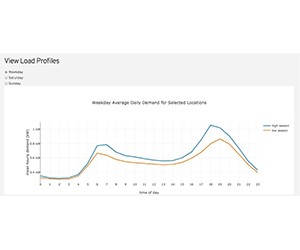Data is essential to map energy behaviour and progress towards sustainable development goals and is instrumental in planning expansion and maintenance of South Africa’s power generation, transmission and distribution infrastructure.
“Between 1994 and 2014, Eskom collected massive amounts of residential load data, using loggers to measure community consumption at main energy suppliers, and surveying 15 000 households to correlate the loggers’ data, to create socio-economic profiles,” explains Resmun Moonsamy, Project Manager: Data & Knowledge Management at the South African National Energy Development Institute, (SANEDI).
“However, most researchers were unaware of this treasure trove of information or how to access it, as South African legacy systems made it difficult to access and manipulate the data.
“In 2017, the Energy Research Centre (ERC) at the University of Cape Town, supported by SANEDI, started building data analytics and visualisation tools to enable researchers with limited coding skills to explore the data quickly and easily.
“In April 2019, the project launched as South Africa's first online, citeable datasets of Domestic Electrical Load (DEL) studies. The published DEL datasets cover the period of major electrification in South Africa from 1994 to 2014 and span five climatic zones, two time zones and various population groups.
“The datasets are unique on the African continent and available to researchers for non-commercial use, opening data-driven energy research to a broader audience, through digitisation and open data. Together with the five published DEL datasets, the project has released two open source python packages to facilitate data access and processing.
“The goals of the project are to provide strategic support and leadership to convene and mobilise key stakeholders towards building big data capabilities for domestic load research and to deliver technical data science and data stewardship activities.
“The Big Data for Household Energy Insights project is now housed at the Energy Systems, Economics & Policy group at the University of Cape Town.
“In June 2019, a workshop with the South African Institute of Electrical Engineers (SAIEE) Load Research Chapter, highlighted how machine learning and artificial intelligence can be applied to the DEL datasets, to understand better the typical household demand patterns in South Africa.
“Over the coming months, Big Data for Household Energy Insights will collaborate with the SAIEE Load Research Chapter to release further training webinars that help incoming researchers understand and work with the DEL datasets.
“This work is tremendously exciting, as it allows local and international researchers to understand the drive to electrification in a developing economy and the rise of energy usage in various socio-economic groups. SANEDI is proud to have been an integral part of this development and looks forward to more development in this research. A data portal that will enable South African citizens to engage with the data is under development,” concludes Moonsamy.










